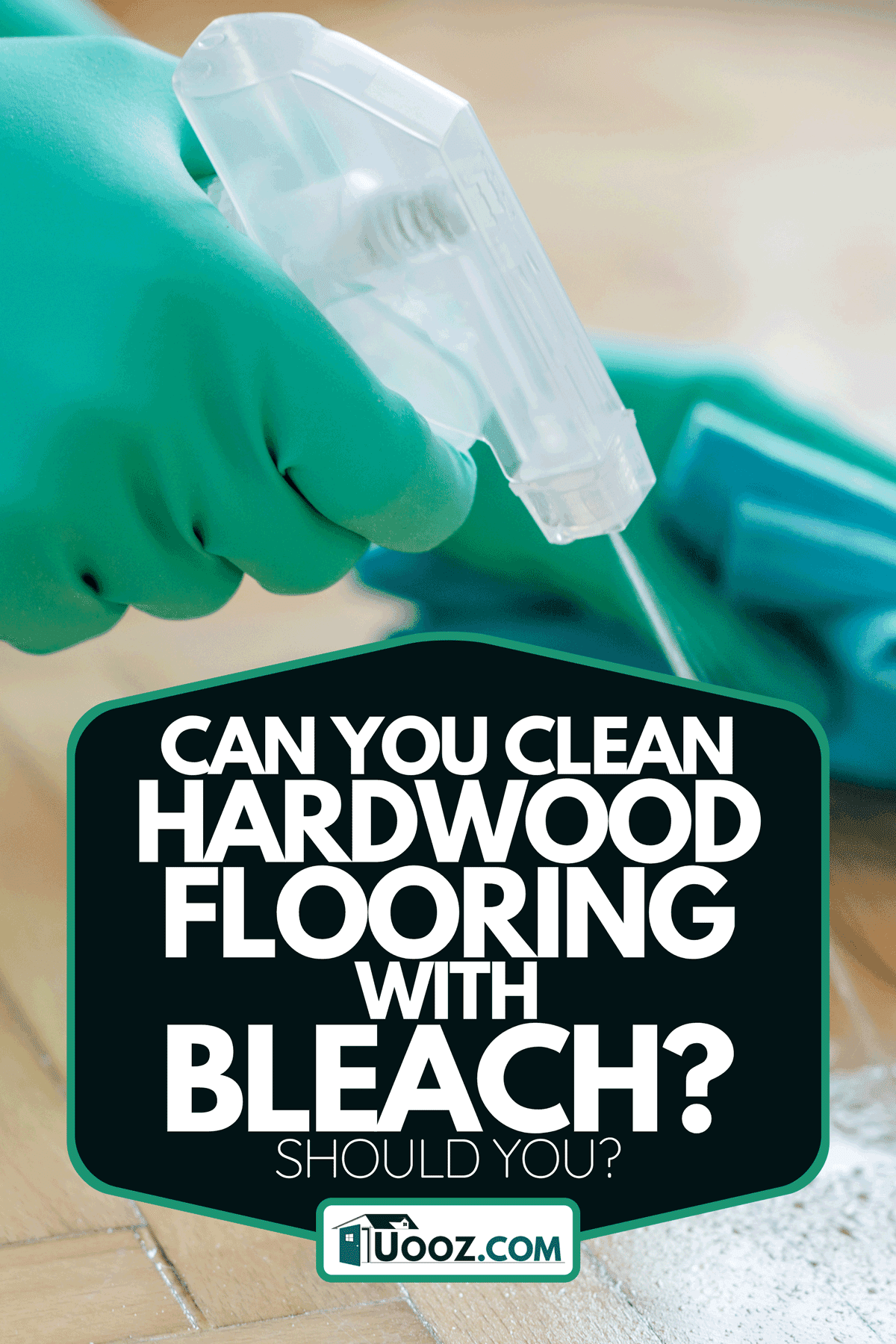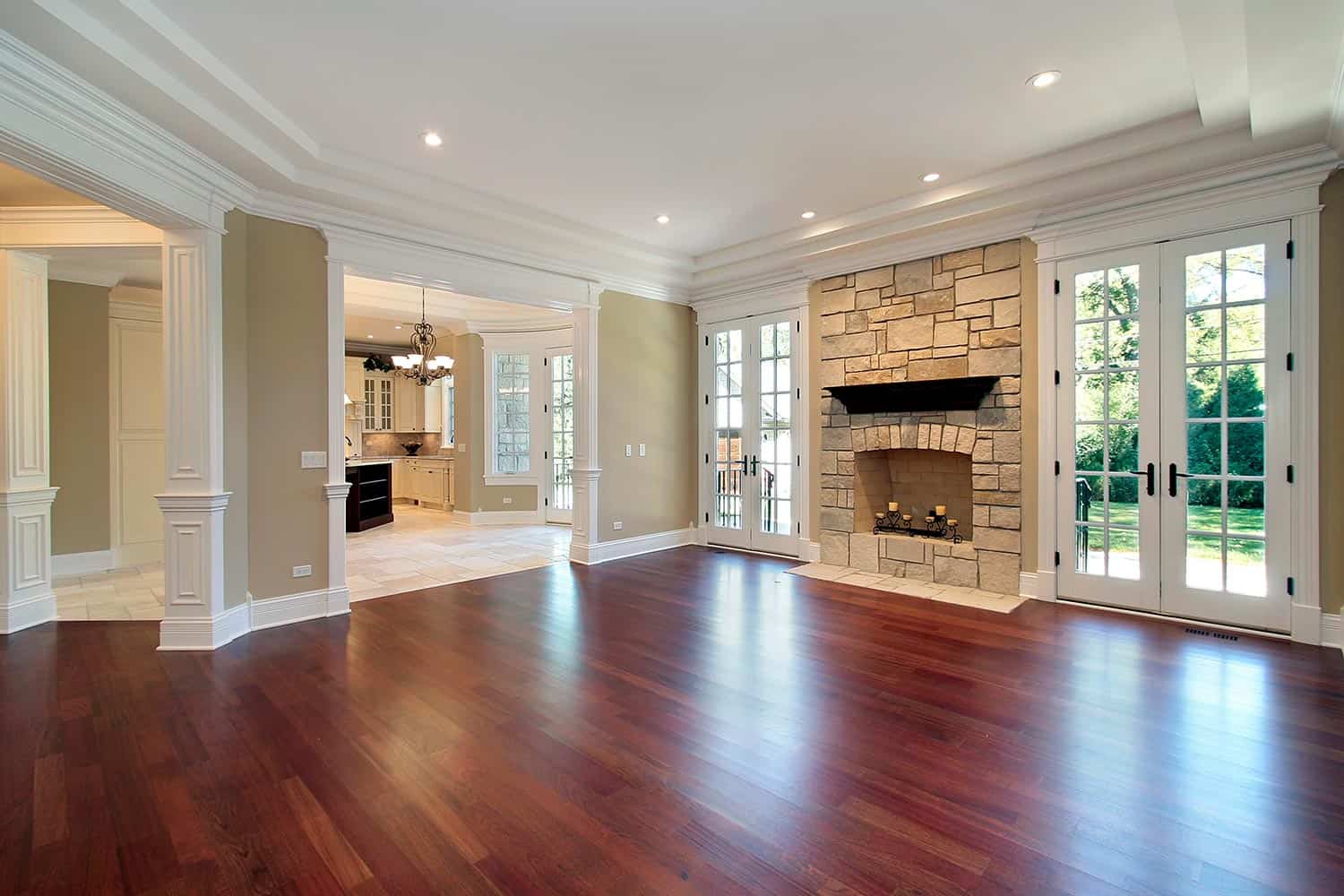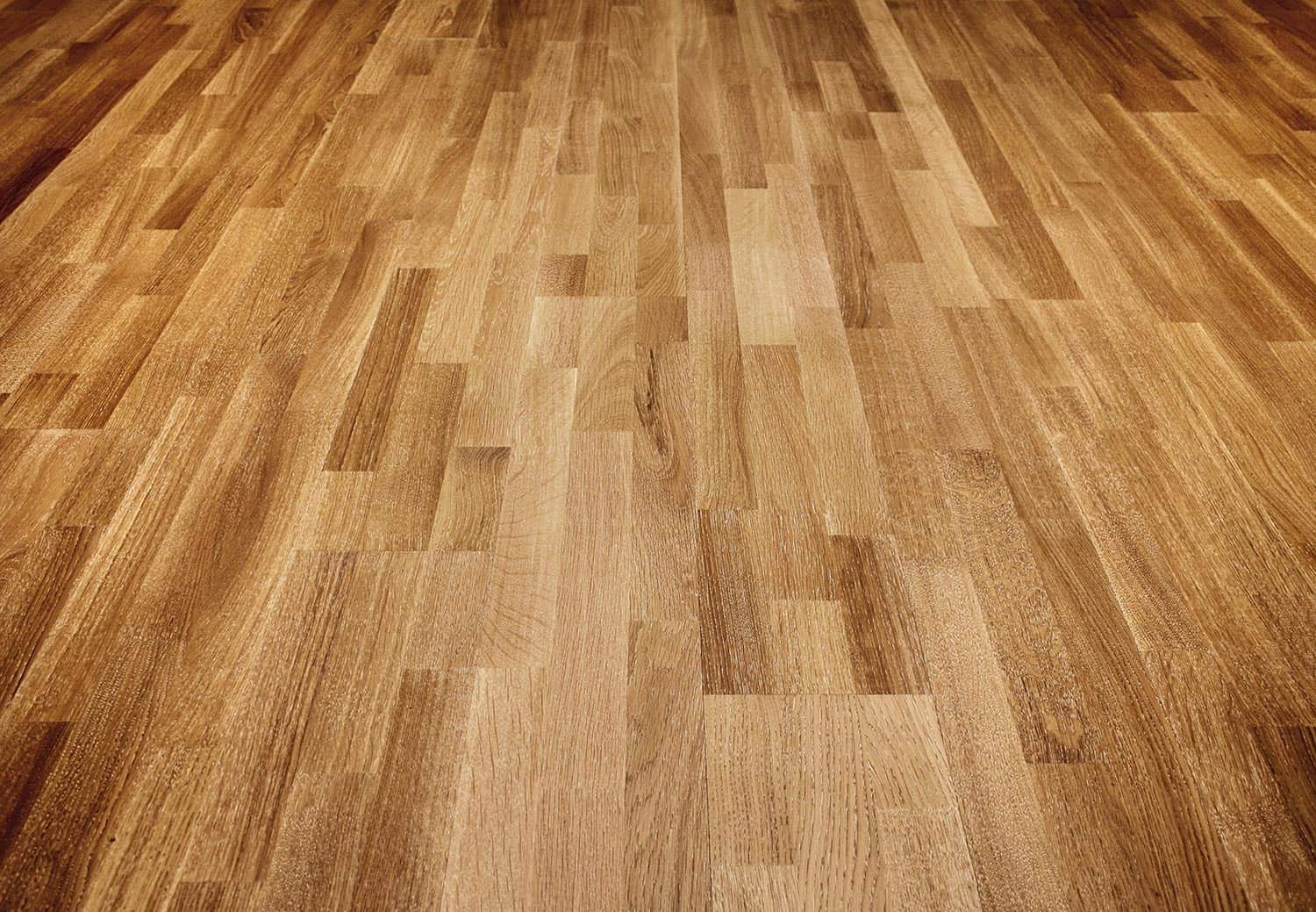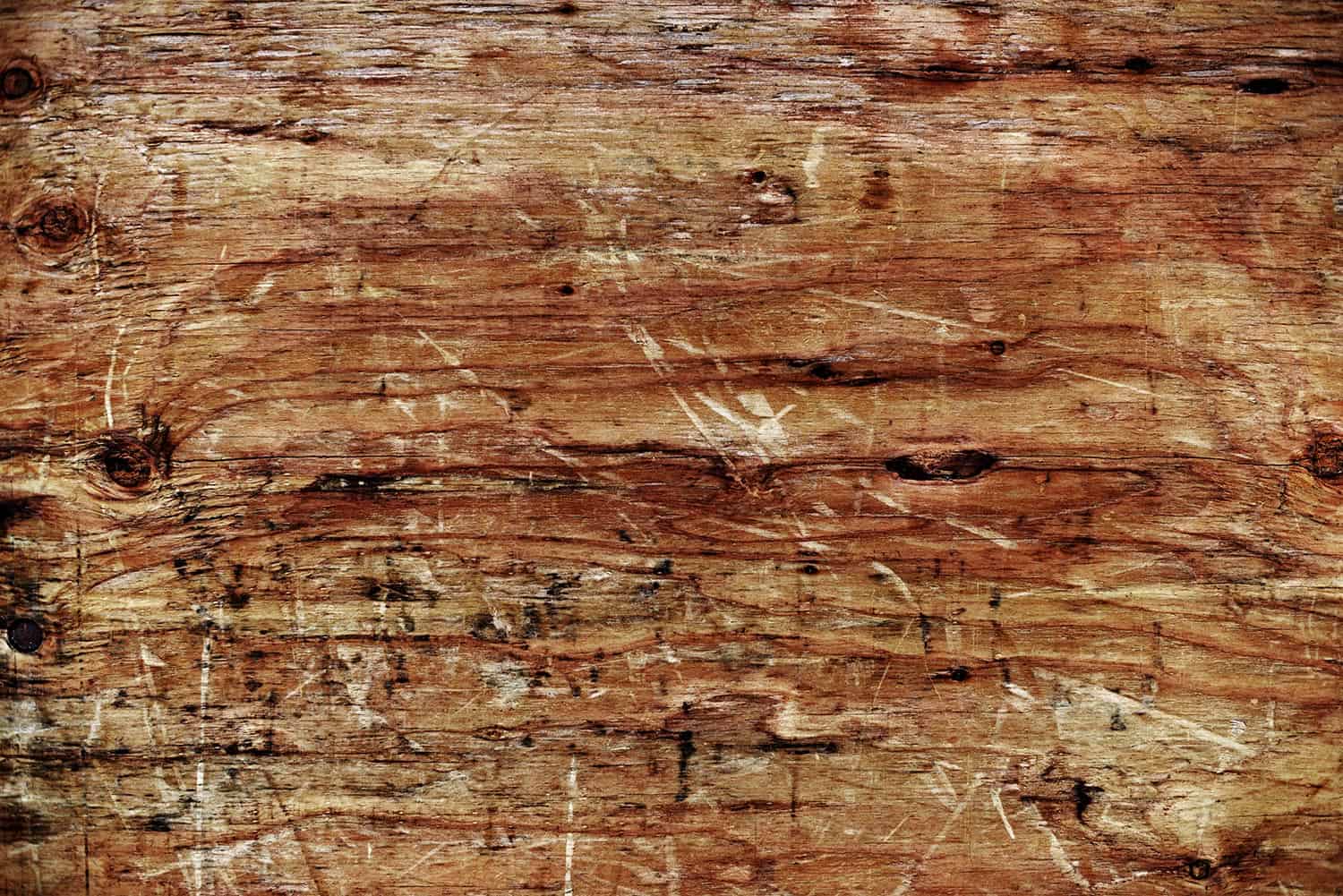Hardwood floors are a beautiful addition to any home, but it takes some special cleaning methods to take care of them properly. Sweeping up dirt is easy, but what about stains and spills you can't sweep up? Bleach is a great all-around cleaning agent that disinfects and cleans all kinds of surfaces around the house, though it is a rather harsh chemical. You've probably wondered if it's safe to use bleach on your hardwood floors, so we've done the necessary research to tell you whether or not it's safe.
While bleach can disinfect your floor and remove stains, it is not recommended for hardwood floors. Because wood is a porous surface, bleach can penetrate the wood floor, damaging the wood and fading or harming the finish. Similar to discoloring some clothes in the laundry when you use bleach, your wood floors can become discolored as well, swapping out a stain for a discolored patch instead.
While cleaning wood floors with bleach isn't a good idea, there are plenty of other ways to get your floor cleaned up. We encourage you to continue reading as we explain the downsides of using bleach on your hardwood floors. We'll suggest better cleaning options and answer some other common questions you may have about cleaning your hardwood floors.

Cleaning Hardwood Flooring With Bleach
We've already explained that cleaning hardwood with bleach is a bad idea and given a couple of reasons why. As with anything, there are pros and cons to using bleach on your hardwood floors. Here we'll explain why you shouldn't use bleach on your floors, but also give the reasons and exceptions when it's okay.
What happens if you clean wood floors with bleach?
Bleach is great at killing germs, and if you're worried about disinfecting surfaces, bleach is an ideal choice. Using it on your floors will absolutely disinfect them and kill germs and mold in the wood. Unfortunately, that's where the pros of using bleach on hardwood end.
A harsh cleaner like bleach works so well because it gets into the small pores and valleys of a surface to bubble out dirt and kills harmful things on the surface. Because it's so good at penetrating surfaces and wood is so porous, bleach will get into your wood even if it has a solid finish on it.
It then discolors the finish on the wood, leaving you with patches on your floor and can even damage the wood by making it break down. Continuing use can cause your floor to begin breaking apart and coming up.
When Can I Use Bleach on My Floor
There are some cases where using bleach is okay. You'll need to test your floor in a small, out-of-the-way spot before cleaning big areas. You can follow these steps to test your floor and determine whether the floor's finish, age, and quality will allow you to clean it with bleach:
- Mix 3/4-cup of bleach with 1-gallon of water to dilute it.
- Wipe and/or wash the floor with water, then apply the bleach solution and let stand 5 minutes.
- Rinse the area, and then let air dry.
If you don't see discoloration and the wood dries easily, then it's probably safe to use this kind of diluted solution to clean your floor. That being said, it is much safer to use alternative cleaning methods, which we will discuss further in the article. If you decide to use bleach like this, work in small sections so you can rinse it off quickly and don't let the solution sit on the flooring too long.
What is the best thing to use to clean my hardwood floors?

There are much better and safer ways to clean your hardwood floors instead of using bleach. Before using any kind of cleaner, remember to sweep or dust your floor to remove the dust and dirt from the surfaces you'll be cleaning.
You'll then want to use your preferred cleaning solution, mop and wipe the floor, rinse, and dry it up with a clean cloth or mop. Like bleach, work in smaller, manageable sections to ensure you aren't damaging the wood and limiting the time the wood is wet.
There are specialized cleaners for wood flooring available like Bona and Murphy Oil Soap. You can also make a solution of your own at home using water and either Castille Soap or dish soap. All of these will help remove dirt and stains from your hardwood and are much less likely to damage them than bleach is.
How do you deep clean hardwood floors?

Deep cleaning should be done every few months, in addition to your regular cleaning. A deep clean goes further than a surface level clean to remove ground-in dirt. The benefits of deep cleaning your floors include protecting the wood's finish, better air quality, and saving you money by extending the time between your floors needing to be refinished or sanded.
A deep clean can be broken down into five steps and requires a commercial-grade cleaner instead of a light cleaning solution. Here are the steps for how to deep clean your hardwood floors:
- Use a dry mop or broom to get rid of surface-level dirt and dust from the floor.
- Use a wet mop and a microfiber pad to get rid of any dirt left behind from your initial clean. Limit the amount of liquid during this period to avoid damaging your flooring.
- Look for stains and problem areas on your floor and apply a floor cleaner to remove them. Use a putty knife to get between floorboards and to scrape excess grime off the floor's surface.
- Use a mop pad and mop in the direction of your floorboards with a commercial-grade floor cleaner. Work in small sections and change mop pads often to get the best clean.
- Examine your floor to see if dirt and stains remain and give them more focus if necessary.
Will Swiffer ruin hardwood floors?
Swiffer mops and pads work great for removing dirt and breaking up build-up on floors, whether it's a mop pad or a WetJet. If your floor is finished properly, they're perfectly safe for use in cleaning hardwood. If your floor is unfinished, oiled, or waxed, a Swiffer can break down the wood or finish on these types of flooring.
Can I use Pine-Sol on hardwood floors?

Pine-Sol is safe for hardwood floors. While it can penetrate the surface, it doesn't harm the finish or damage the wood, especially if properly diluted. In addition to helping break up dirt, Pine-Sol is a deodorant and a disinfectant, making it a solid option for keeping your hardwood floors clean.
While Pine-Sol claims to be safe on hardwood poured straight from the bottle, diluting the cleaner is the best option if you're worried about it. Mix 1/4-cup of Pine-Sol with a gallon of water, and then mop your floor with it. Make sure not to leave puddles to avoid warping the wood.
Pine-Sol is also great for grease buildup and can be used in small spots like this without diluting. Make sure to use a toothbrush or sponge and avoid hard and metal bristles so you don't scratch up your floor. Like Swiffer cleaners, Pine-Sol works best on finished flooring and, like nearly all cleaners, isn't safe on unfinished, oiled, and waxed floors.
How much does it cost to have hardwood floors professionally cleaned?
Sometimes you'll have stains that seem impossible to remove. Before you decide to tear up your floor and replace a section, you might want to consider hiring a professional cleaner to see what they can do with the area.
The cost of hiring a professional is usually quoted in the square footage of the floor to be cleaned. Since you likely won't be needing them to deep clean large sections, it might not be as expensive as you think.
A simple clean will usually run between $0.50 and $0.75 per square foot. Add on an additional $1.25 - $1.75 per square foot for buffing and $0.65 - $1.25 per square foot to recoat the floor. There will also likely be a fee for coming to your home and doing the cleaning.
For a 10-foot by 10-foot (100 square feet) section of floor, you should expect to pay between $240 and $375 for a full deep clean, buff, and refinish. You'll likely have a smaller area you need cleaned and may opt-out of a buff or refinish, so you can easily end up paying less than these figures.
In Closing
Using bleach to clean your hardwood floors is not a great idea, especially when there are so many other options that are much safer and less harmful. A small investment in some good cleaning tools like a Swiffer WetJet or microfiber mop pads and a homemade cleaner is a much better choice that can help preserve your floors for years to come.
